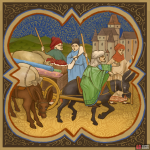Text
In ancient times, a foreigner was not only someone who did not originate from the community (and therefore a potential enemy), but also a person without legal status. Foreigners were considered without rights until they paid a surety. Courts and various regulations addressed issues such as fees for trading or renting a house (which they were not allowed to acquire or inherit).
The Czech lands remained relatively open to foreigners for a long time, fostering active cultural and commercial exchanges. Initially inhabited by Celts, they were later replaced by Germanic tribes and eventually by Slavs, although with a significant proportion of German speakers. Germans mostly lived on royal estates or worked as entrepreneurs and merchants. The relationship with Germans was initially neutral, but later cooled and became more strained, leading to local hostility “against all things German,” although classic nationalism of the 19th century had not yet emerged.
Both Czechs and Germans had worse relations with Jews, who lived outside society and were often subjected to pogroms (with the king’s permission and hefty payments).
Diseases and the Black Death in the mid-14th century influenced migration, resulting in fewer foreigners moving to the Czech lands. During the Hussite Wars, Czechs became the majority in most cities. German remained the main language in Moravia’s major centres: Brno, Jihlava, and Olomouc.
Czech gradually evolved from a rural language into a language of the upper classes. A pivotal shift in the perception of linguistic and ethnic differences occurred during the Hussite Wars, where most Czech speakers identified with the Hussites, while Germans (for the most part) sided with Sigismund and the Pope. Foreign (often German) crusades against the “rebellious Hussites,” convened by Sigismund, also contributed to these divisions.


No Comments